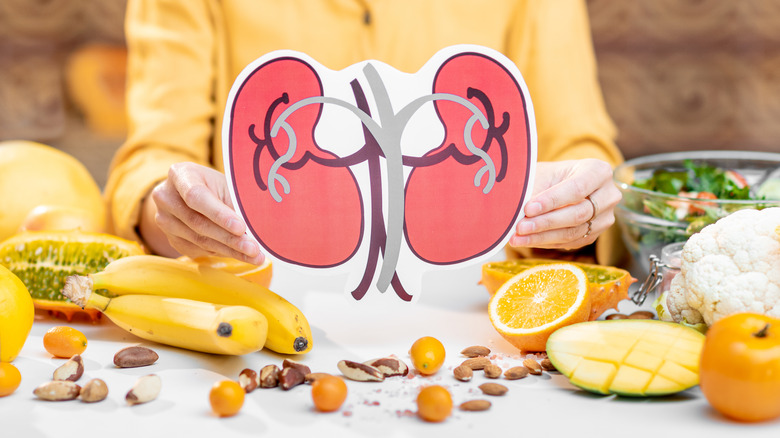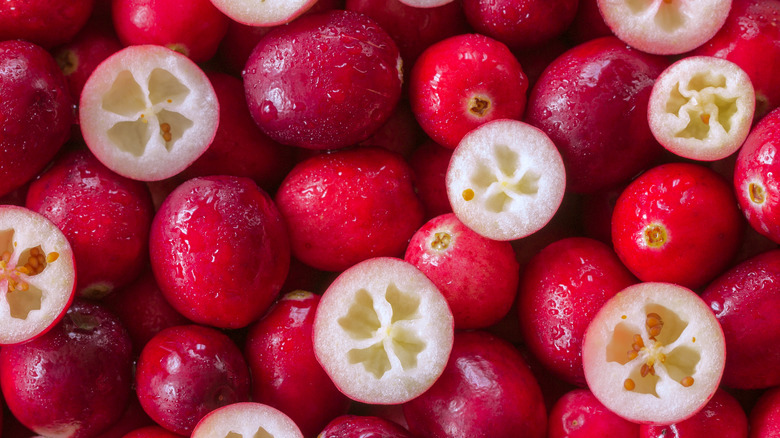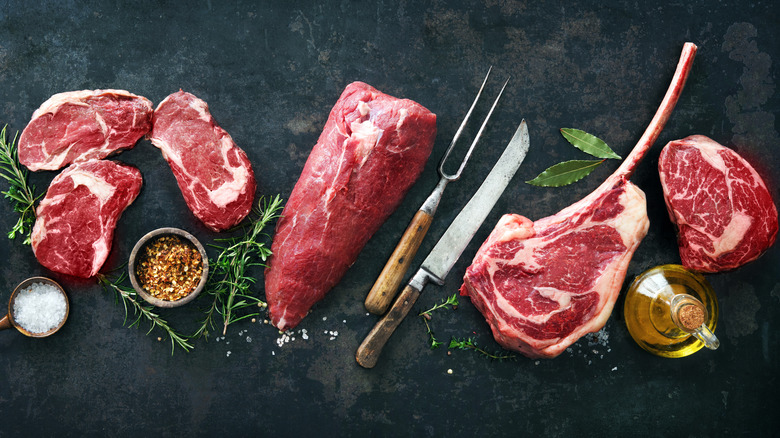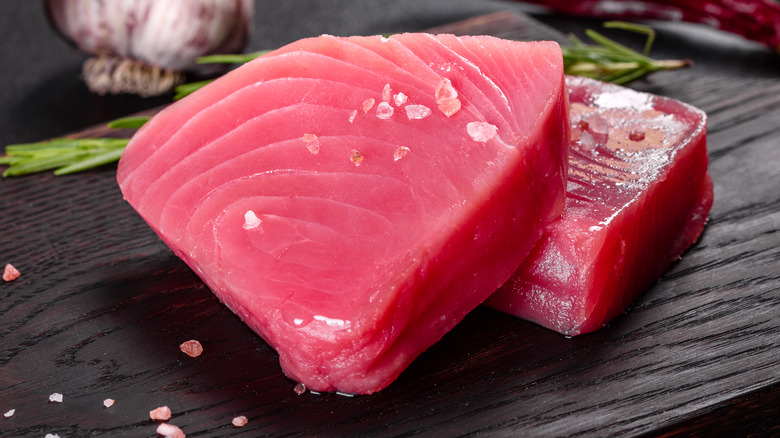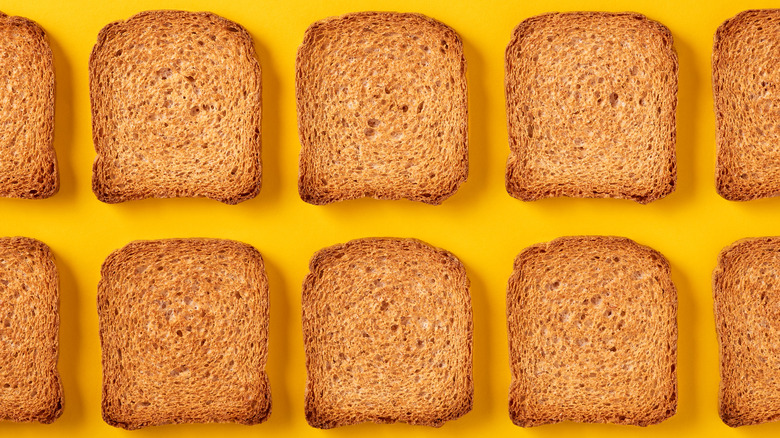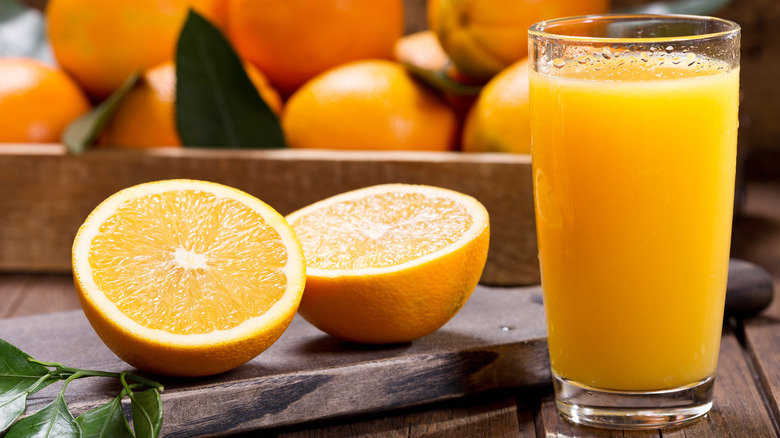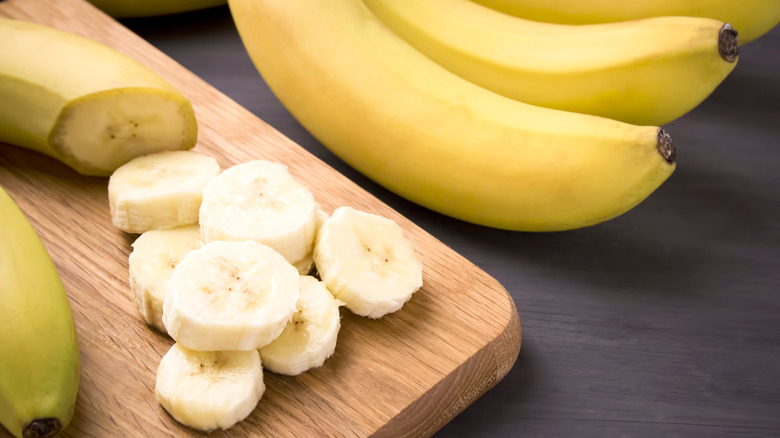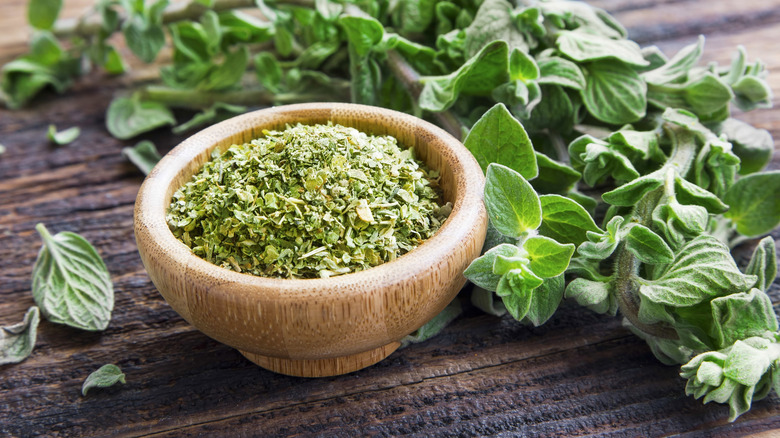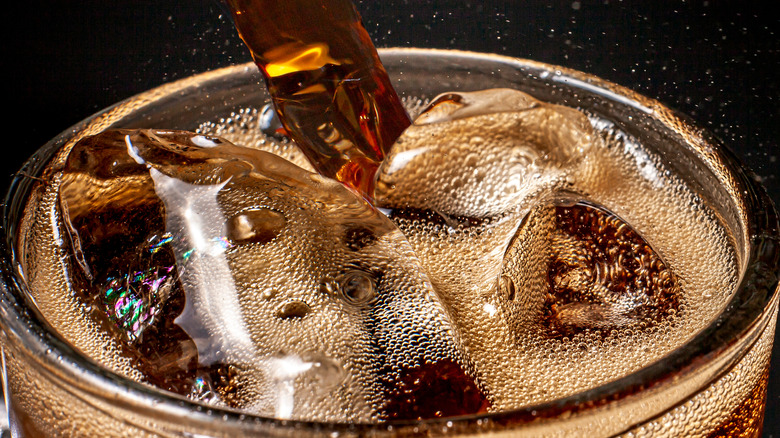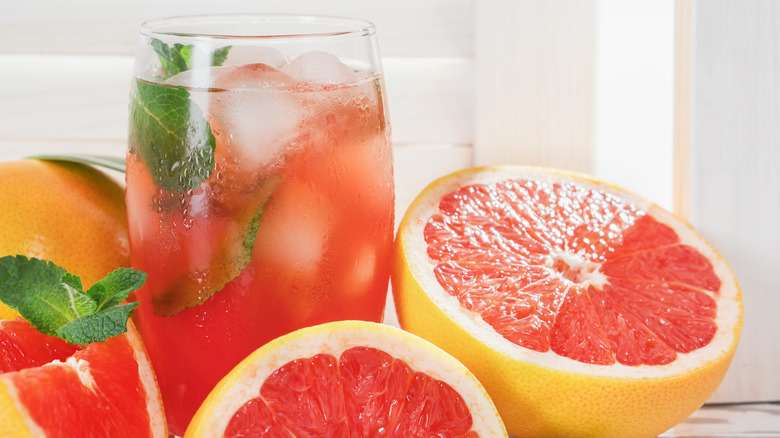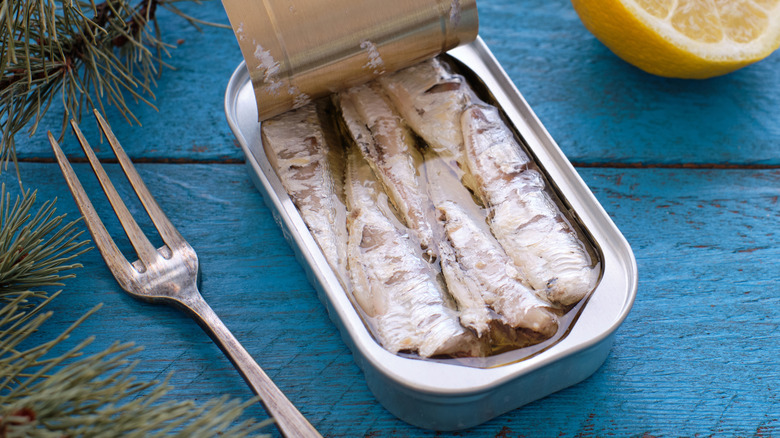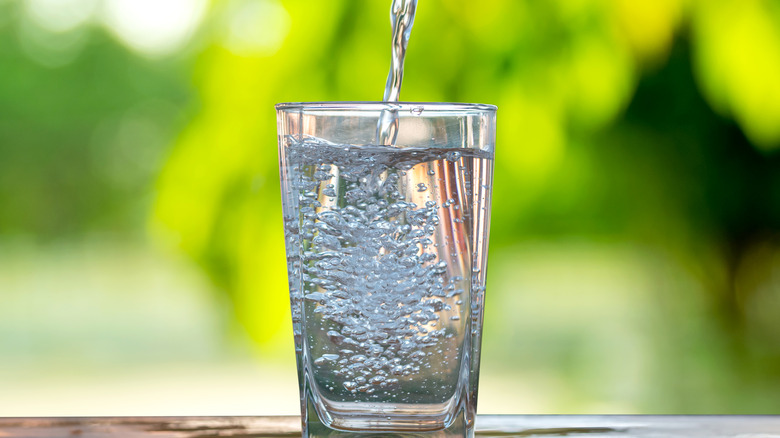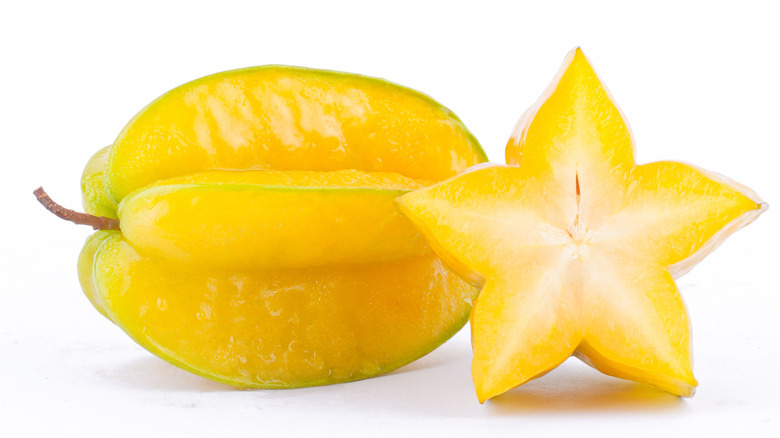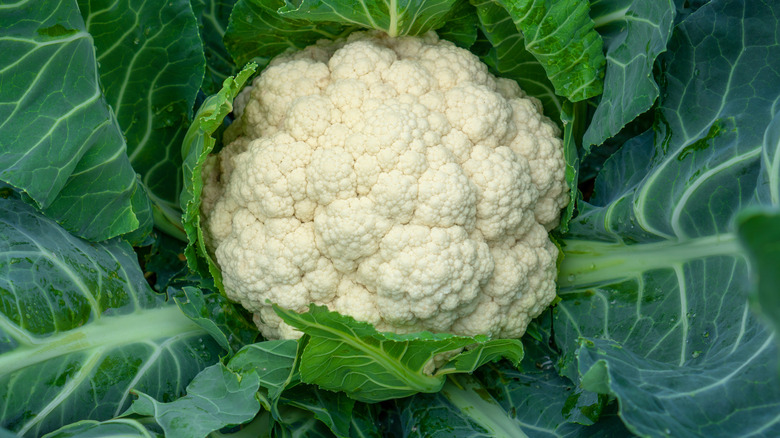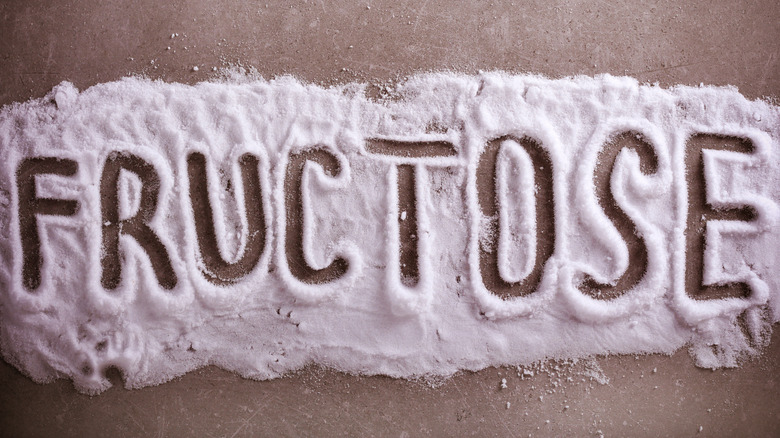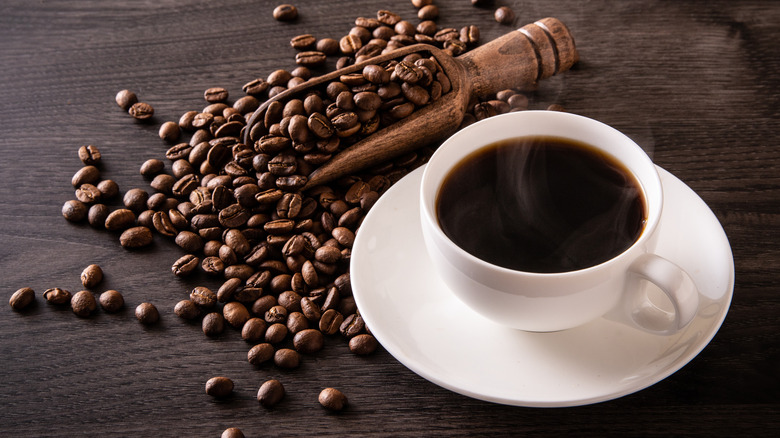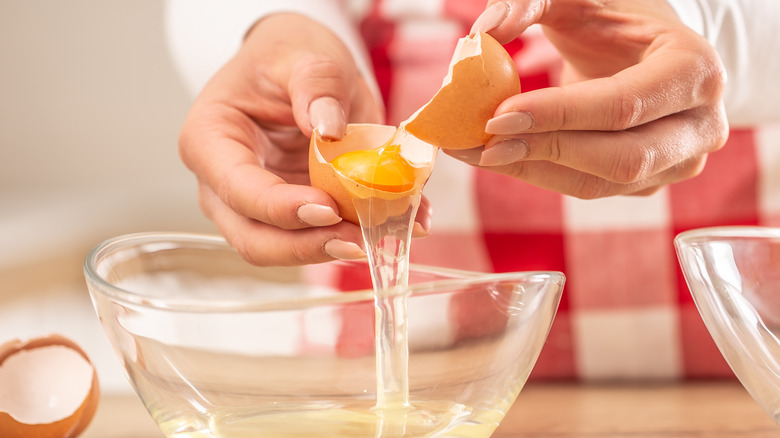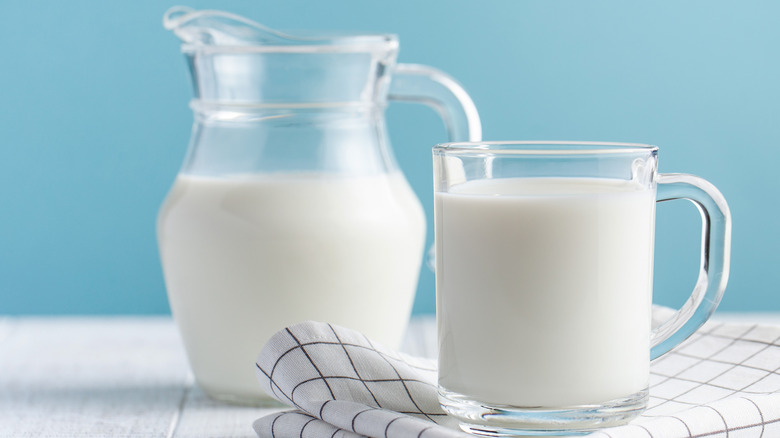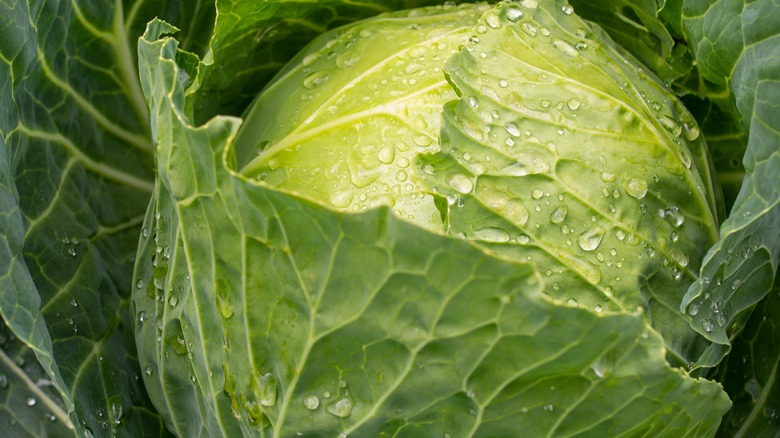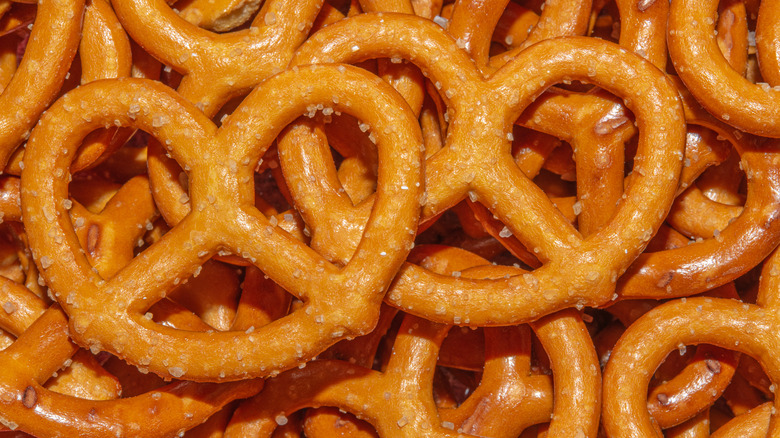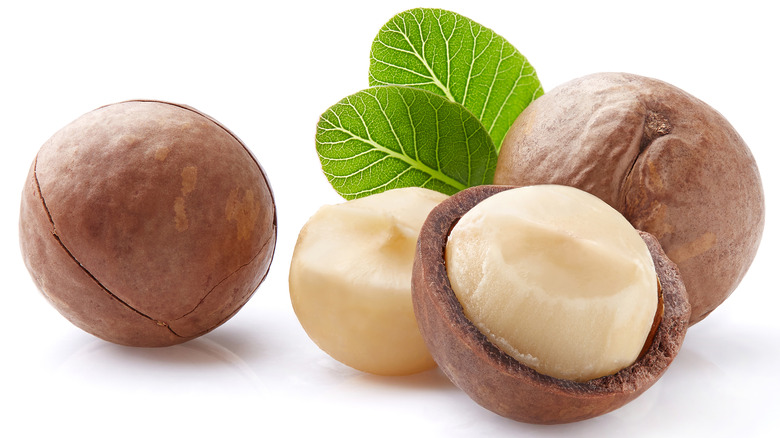10 Foods To Eat And 10 To Avoid For Kidney Health
Did you know that your kidneys help keep your blood pressure from going too high or too low? No, that's not a typo. Besides being a crucial part of your endocrine system (a.k.a. the parts of your body responsible for getting rid of waste products), your kidneys create hormones that are necessary for your blood pressure to stay at the right levels (via National Kidney Foundation). They're also crucial for your bones' health, as well as making sure your body has the right amount of red blood cells.
Yes, kidneys are vital to good health in a number of ways, and like all the other parts of the human body, the foods and drinks we consume can affect them for the better — or the worse. Of course, some dishes or beverages might be obviously bad because they're not healthy in general. And if you're someone who avoids junk food or calorie-loaded desserts, you might think that you're automatically keeping your kidneys strong and healthy. That's very logical and understandable, but it's not 100% accurate. While steering clear of certain foods is good for your overall health, there are quite a few foods normally thought of as healthy that can actually be harmful for your kidneys. What's more, foods that can help support your kidneys go far beyond what's typically found in a cleanse or a detox regime.
Eat: Berries
Whether you enjoy berries in smoothies, muffins, or with a little dab of whipped cream in a bowl, these sometimes sweet, sometimes tart little treats are commonly found in a variety of healthy meal plans. And while they're good for your brain's health, they're also an excellent choice for your kidneys both because of what they contain and because of what they lack (via Healthline).
Take cranberries, for example. These little red berries have a compound that can be crucial for your endocrine system's good health. Known as A-type proanthocyanidins, this component in cranberries helps flush potentially harmful bacteria out of your bladder and urinary tract. Remember, your kidneys are connected to these waste-flushing systems, so getting rid of this bacteria reduces your chances of developing an infection. And if you already have kidney disease, the last thing you want is further complications in your endocrine system.
Besides cranberries, Healthline points out that blueberries are also good for your kidneys since they (like cranberries) contain only small amounts of phosphorus, sodium, and potassium. While these three are common components in foods and drinks, they can be taxing on your kidneys in large amounts. Plus, a type of antioxidant found in blueberries might reduce your chances of developing diabetes, heart issues, and some types of cancers, as well as help to keep your mind sharp.
Avoid: Red meat
When we think of red meat, usually a juicy steak or freshly grilled hamburger are the first foods that pop into our minds. Beef, however, is only one type of red meat. As Medical News Today notes, both pork and lamb can be categorized as this type of meat. And while giving it up altogether might not be necessary, you might want to think twice about making it a part of your everyday diet if you have issues with your kidneys.
Before we go any further, we need to discuss a condition called chronic kidney disease, or CKD. As the Mayo Clinic explains, this ailment is when your kidneys over time work less efficiently. Eventually, CKD can worsen until you develop end-stage renal disease or ESRD (via Medical News Today). And if this occurs, then your kidneys either won't be able to function properly without dialysis treatments, or will need to be replaced via transplant surgery. So, what does all this have to do with red meat? Well, a study conducted over a roughly 15.5-year period, found that eating red meat increased one's chances of developing ESRD (via Medical News Today). In addition, the data showed that switching out one red meat meal per week for another type of protein decreased the likelihood of ESRD by more than 60%. So, if you have CKD or are just concerned about your kidneys' health, you might want to keep a food journal and track how often you eat red meat.
Eat: Tuna
Whether it's in a sushi roll or in a can, tuna is a flavorful fish that's readily available and packed with nutrients. However, unlike other foods on this list that support good kidney health, there are some concerns when it comes to tuna and your overall good health. As Medical News Today explains, tuna is a good source of omega-3 fatty acids, which can have a number of positive impacts on one's health. In terms of your kidneys, omega-3s can be helpful because they have been shown to marginally improve high blood pressure. And since blood pressure issues can increase your chances of developing kidney disease, keeping your blood pressure levels steady is important for your kidneys' health. In addition, omega-3s might help with other medical issues like inflammatory bowel disease and an abnormal heartbeat (via Medical News Today).
But while tuna can be a positive addition to your diet, registered dietitian Julia Zumpano notes on the Cleveland Clinic's website that eating tuna can mean ingesting mercury. She explains that, "unless you're purchasing from a company that checks the mercury levels of each can," canned tuna — especially Albacore — can be loaded with this toxic metal. She also cautions that "... very few companies currently take this extra step" to check each can for mercury. So, before your next trip to the supermarket, you might want to do a little research on different tuna brands.
Avoid: Whole wheat bread
It's time for a pop quiz. Which is healthier: a) whole wheat bread or b) white bread? If you said, whole wheat bread, you're right ... except when it comes to your kidneys (via Healthline). Yes, believe it or not, the rules for which bread is good for you are turned on their head if you have kidney disease. As you'd expect from its name, whole wheat bread is made from whole grains. Now, this can be beneficial for one's health, as can another common ingredient in whole wheat bread: bran. But, breads with high amounts of bran and whole grains also have more potassium and phosphorus, both of which can be taxing on your kidneys. Plus, bread in general can have large amounts of sodium, which can increase your chances of developing kidney stones (via Healthline and Harvard Health Publishing).
So, does this mean you have to cut all bread out of your diet? Well, as Healthline explains, you might not need to go that far. There are lower-sodium breads on the market, which might help take some pressure off your kidneys. You also can reduce how much bread you eat rather than remove it from your diet entirely. However, before you make any changes to your regular meal plan, you should speak with your healthcare professional or a nutritionist.
Drink: Orange juice
Usually, citrus fruits are lumped into one healthy category that provide (more or less) the same wellness benefits. With that in mind, it would seem like these fruits are all interchangeable. In other words, if you had a cold, in theory it wouldn't matter if you ate oranges or limes because, again in theory, both would provide you with the similar nutrients (via Souper Sage). But research has found evidence that not all members of the citrus fruit family are equally good for your health when it comes to your kidneys.
According to WebMD, one study had thirteen individuals go on a kidney-friendly diet that involved drinking orange juice, lemonade, or water three times daily for a week. The data revealed that although both orange juice and lemonade are made from citrus fruits, only the orange juice lowered the participants' chances of developing kidney stones. How? Well, orange juice, like other citrus juices, contains citrate, which can lower the acidity in your urine and, in the process, reduce your risk of developing kidney stones. In fact, citrus juice is sometimes recommended for patients who have had kidney stones but are unable to tolerate potassium citrate supplements.
Avoid: Bananas
Now, let's be clear about one thing: Bananas are safe for kidneys that are healthy (via MedicineNet). In fact, unless your healthcare professional advises you otherwise, bananas are in general a healthy food choice for your diet. But for someone with damaged kidneys, bananas can take a bad situation and make it worse. This is because bananas are rich in the mineral potassium. Yes, the same potassium that might be listed as an ingredient in your multivitamin, and is found in a number of foods, including vegetables and fruits. But when your kidneys are damaged, they cause the potassium levels in your blood to rise, which can jeopardize your heart's health and potentially cause a heart attack (per MedicineNet and American Kidney Fund). So, as you can imagine, consuming something high in potassium can be like throwing gasoline on a fire. In addition, the MedicineNet notes that bananas are often off the menu for someone with advanced kidney disease.
Eat: Oregano
Although we don't think of it in the same way as we do peppermint, the herb oregano is actually in the mint family. And if you have type 2 diabetes, it might not only help regulate your blood sugar, but can also reverse some of the damage to your kidneys. As the National Kidney Foundation's website explains, high amounts of blood glucose levels (a.k.a. blood sugar) can take its toll on one's kidneys. Specifically, the blood vessels located in the kidneys can become smaller, leading to less blood flow and kidney damage. But, according to Medical News Today, one study on rodents determined that elements found in oregano might have multiple positive impacts on the body, including helping damaged kidney tissues heal (via Iranian Journal of Pharmaceutical Research).
In addition, the study's data supports that oregano might help with a condition directly connected to type 2 diabetes called insulin resistance, in which your body can no longer properly process sugar. If this occurs, then your blood glucose levels can rise, endangering your kidneys. In fact, the authors of the study said more than one form of oregano is currently being used by humans to keep their blood sugar levels from spiking. So, if you have type 2 diabetes, you might want to speak with your healthcare professional about adding oregano oil or leaves to your diabetes management routine.
Avoid: Diet soda
Making artificial sweeteners a regular part of your diet can be detrimental to your health (via Verywell Health). So, it's not a shock that drinking diet soda everyday can make you more susceptible to a number of medical problems. Case in point, a 20-year study found that having more than one diet soda daily could eventually take a toll on your kidneys (via National Kidney Foundation). According to the National Kidney Foundation's website, more than 3,000 female nurses participated in the study. Although all of the women started out with healthy kidneys, that changed once a portion of the group began drinking several diet sodas daily. As a result, these participants' kidneys had a notably lower glomerular filtration rate than the other members of the study. This means that blood wasn't flowing as quickly through the tiny filters (called glomeruli) that are located in their kidneys, indicating that their kidneys weren't functioning as well as they did at the beginning of the study (via MedlinePlus).
So, will an occasional diet soda hurt your kidneys? According to the National Kidney Foundation's website, probably not. In fact, you might even be safe in terms of your kidneys' health if you indulged in one diet soda per day. However, increase that number to two, and you could be looking at issues with how well your kidneys are working in the not-so-far-off future.
Drink: Grapefruit juice
Grapefruit is one of those members of the citrus family that people either love or hate — and for good reason. This fruit's blend of sweet, sour, and even bitter flavors can be a bit strong (via Hale Groves). However, even if it's not your favorite citrus, you might want to add it to your diet for the sake of your kidneys. According to Men's Health, grapefruit has a substance called naringenin, which might reduce your chances of developing cysts on your kidneys. Remember, cysts are sacs that can form on your organs, and in some cases can cause your kidneys to stop working (via Merriam Webster). In addition, Dr. Tieraona Low Dog, who is an expert in the fields of dietary supplements and integrative medicine, says on Dr. Andrew Weil's website that naringenin might help regulate insulin and blood sugar spikes that occur right after eating. This means this compound that is found in grapefruits is potentially good for maintaining a healthy weight, as well as reducing the chances of developing high blood pressure, insulin resistance, and type 2 diabetes, all of which can have a negative impact on the kidneys.
Although grapefruit juice can support the health of your kidneys, it also may interact with some medications (via Dr. Andrew Weil's website). So, if you're taking either prescription or over-the-counter treatments for blood pressure, allergies, anxiety, or cholesterol, you should speak with your doctor before adding grapefruit juice to your kidney-friendly diet.
Avoid: Canned sardines
This often-joked-about pizza topping can boast something that many other fish can't: low mercury content (via WebMD). This is because sardines mainly feed on tiny plant and animal life called plankton, which apparently is the perfect diet if you want less toxic metal in your fish (via Merriam Webster). Plus, this silver fish is an excellent source of omega-3 fatty acids, which can be good for your heart and circulatory system in general. Unfortunately, this is where the good news ends.
Although canned sardines have their health benefits, they're also rich in a chemical called purines (via WebMD). When you eat a sardine, your body turns the fish's purines into a substance called uric acid, which increases your chances of developing kidney stones. And as if that wasn't enough of a concern, canned sardines are very salty, and that alone raises the odds that you'll get kidney stones since sodium boosts the calcium levels in urine. Plus, that salt content might go up depending on whether the sardines are packed in plain water or tomato juice.
Besides being potentially bad for your kidneys, the purines in canned sardines can also exacerbate gout, a disease that affects your metabolism and can cause joint pain (via WebMD). In addition, the salt content in sardines is bad for blood pressure, since sodium causes water retention that can raise your blood's volume, making it more difficult for your heart to circulate it throughout your body.
Drink: Water
Sometimes the most obvious dietary change can get overlooked. Case in point, drinking enough water daily. But beyond the importance of staying properly hydrated (via Healthline), water is crucial for keeping your kidneys healthy and strong. According to the Mayo Clinic, the most common type of kidney stones are calcium stones, which are made of calcium and substances like phosphorus and oxalate. Large amounts of vitamin D can also increase your chances of developing calcium stones, which can be painful to pass. Now to be fair, diet is a factor when it comes to developing these stones. However, as the Mayo Clinic recommends, dehydration and kidney stones go hand in hand, especially if you live in a dry, warm area of the world. In fact, to avoid kidney stones, Healthline recommends drinking more than the conventional eight glasses of water per day, because water thins and weakens the substances in your body that can turn into those painful deposits.
Besides helping to ward off kidney stones, drinking water has another major benefit for your kidneys: flushing them out. Remember, the kidneys help to filter out not just waste products from your body but also medications (via National Kidney Foundation). Think of it this way: If you had a trashcan and never put a bag in it, you'd have to clean it from time to time because the garbage would leave a residue inside of it. In the same way, drinking enough water is how you can help keep your kidneys clean and functioning normally.
Avoid: Star Fruit
Don't let this fruit's festive appearance fool you. While star fruit (also known as carambola) is packed with antioxidants, eating too much of this tart citrus fruit, or snacking on it when it's not yet ripe, can be detrimental to your kidneys (via Medical News Today). This is because star fruit is packed with oxalate, which in high quantities can cause stones to form in your kidneys. In fact, according to the Mayo Clinic, the most common type of kidney stones is a combination of calcium and either oxalate or phosphorus. And if kidney stones sound like an unpleasant consequence of eating carambola, then get ready because they're just the tip of the iceberg.
According to Medical News Today, it doesn't matter if you have issues with your kidneys or have never had a problem with your kidneys in your life. In both cases, star fruit can lead to serious medical problems. For example, Medical News Today states outright that "eating star fruit could be extremely dangerous and possibly fatal" if you have chronic kidney disease. And if you have kidney-related ailments and overdo how much carambola you consume, you could wind up having a seizure. Finally, if you're kidneys are healthy, eating lots of star fruit can hurt them. And one more word of caution: Even if you have no kidney issues and are careful about portion size, carambola can interact with some medications.
Eat: Cauliflower
It's adorned salads, been chopped into rice, taken center stage in veggie platters, and can even be served like a steak. And it's a good thing it can be prepared in a variety of ways since the Cleveland Urology Associates website recommends making cauliflower part of your diet to support your kidneys. As Healthline explains, the secret to cauliflower's potential ability to keep your kidneys healthy is an antioxidant called sulforaphane. Research has found that consuming foods rich in sulforaphane might reduce the possibility of developing diabetes. And since kidney disease can be a complication of diabetes, cauliflower could help keep your kidneys from being damaged from high blood glucose levels. Now, to be fair, this research has focused on animal studies, however, the findings have been promising.
Besides its potential to keep your kidneys functioning properly, the sulforaphane in cauliflower may also help protect your body against a variety of cancers, including leukemia and melanoma, as well as breast, prostate, colon, and pancreatic cancer (via Healthline). Data also supports a connection between consuming this antioxidant and lowering your chances of developing heart disease and high blood pressure since it might help support your circulatory system's good health. In addition, cauliflower is a good source of fiber and nutrients like vitamins B, C, and K (via Cleveland Urology Associates).
Avoid: Foods with fructose
Chances are you've at least heard the word fructose. After all, high fructose corn syrup usually makes headlines as a bad for you food (via Cleveland Clinic). However, for some people fructose may trigger a condition that can be bad for your kidneys and, if ignored, can jeopardize your life.
Before we go any further, we're going to need to address three things when it comes to fructose. First, it's a type of sugar that is found in some plants (most notably vegetables and fruits), as well as honey (via Medical News Today). Second, yes, some fruits can be good for your kidneys ... unless you have certain health conditions. Which brings us to the third point: Just like some people are lactose intolerance and have a hard time digesting milk, a person can also be intolerant of fructose. An especially severe version of this condition is known as hereditary fructose intolerance, where even substances like brown sugar can be problematic. And if the individual with hereditary fructose intolerance doesn't get it treated, their kidneys can stop working entirely.
Besides severe kidney issues, a person with untreated hereditary fructose intolerance may experience other symptoms like liver failure, jaundice, hyperventilating, an aversion to sweet-tasting foods, and vomiting. And for children and infants, this condition can impact their body's development. In fact, if a baby has hereditary fructose intolerance, they might start showing symptoms as they transition from drinking breast milk or formula to eating solid foods.
Avoid: Too much coffee
If you're a coffee lover, don't worry. As Eat This, Not That! explains, as long as you don't have health problems with your kidneys, you should be able to continue enjoying that caffeine buzz from your morning cup of joe. In fact, there's data suggesting that moderate caffeine consumption (one cup of coffee per day) might make a person less likely to develop kidney stones (per The Kidney Foundation). But with all that said, high consumption of caffeinated beverages like coffee can have the opposite effect.
According to Piedmont Healthcare, there's also findings that taking in excessively high amounts of caffeine might lead to kidney stones. Caffeine can also put additional strain on one's kidneys, since it's a type of stimulant. One study from the Clinical Journal of the American Society of Nephrology involving roughly 3,800 participants found possible connections between drinking coffee and the likelihood of developing chronic kidney disease. Additionally, while decaffeinated coffee is notably lower in caffeine than regular coffee, it's not 100% caffeine-free — something to keep in mind if your healthcare provider has you on a strict low caffeine intake diet.
Besides coffee, if you have kidney health issues, you might want to avoid other caffeinated beverages like tea and soda, per Piedmont Healthcare. Also, certain foods may unexpectedly contain caffeine, so you might want to do a little research before you put together your next grocery list.
Try: Egg whites
Whether or not you have health issues involving your kidneys, keeping a medical professional in the loop on your meal plan can help you refine it to really fit your needs. For example, if you enjoy eggs but have developed kidney disease, you might want to consider cutting out the yolk and focusing on the egg whites.
As UCLA explains, our bodies need a certain amount of phosphorus for a number of functions, including developing our bones. But when we take in too much phosphorus from foods and beverages, it falls on our kidneys to filter the extra phosphorus out of our systems before it can cause issues like a heart attack or a stroke. Now, imagine you have health problems with your kidneys, so they're not functioning as well as they normally would. If you consume foods high in phosphorus, that can put extra strain on your kidneys. And if you guessed that eggs are high in phosphorus, you'd be right – but according to UCLA, egg whites can be a "better option" for someone on a kidney-friendly diet.
Besides the phosphorus factor, egg whites are also low in potassium, a mineral that also can be taxing on the kidneys, especially if they're not working normally (per National Kidney Foundation). Plus, egg whites are low in calcium which, despite its many health benefits, can sometimes be problematic in higher amounts for a kidney disease patient (via UCLA).
Avoid: Milk
Decades ago, the "Milk: It does a body good" commercials spoke about the various health benefits of drinking cow's milk. In one ad, a kid talked about how milk would help them grow into a healthy adult, as dissolving scenes created the illusion they were literally growing up before your eyes. However, while milk does have its pluses in terms of nutrition, it might not do a body good when that body belongs to someone with kidney disease.
Milk is a good source of important nutrients your body needs, such as protein (per Kidney Nutrition Institute). But it's also loaded with phosphorus and potassium. Keep in mind that one of the many functions kidneys perform is getting rid of extra potassium and phosphorus, per Medicine (Baltimore). But if your kidneys aren't working at peak capacity, taking in large amounts of phosphorus or potassium can strain them.
Of course, milk also contains calcium, and this is where things can get a little bit complicated. As UCLA explains, kidney disease patients are sometimes advised to limit their daily calcium intake. Specifically, consuming calcium can lead to the formation of certain types of kidney stones known as calcium oxalate stones, according to the National Kidney Foundation. However, some kidney disease patients might benefit from calcium, so it's important to talk with a medical professional about what is right for your specific health needs.
Try: Cabbage
If you're a child of the '80s, you probably remember the Cabbage Patch Kids. But while these adoptable dolls were a major craze, the public has never had the same level of enthusiasm for cabbages. And while that's perfectly understandable, with all the potential benefits cabbages offer, you might want to rethink how you view them.
As Eat This, Not That! explains, cabbages are little nutritious powerhouses. But what's especially important about cabbage is that it contains low amounts of potassium and phosphorus, which are usually not good in high quantities for someone with kidney disease. In addition, cabbage can help nourish the healthy bacteria in your digestive system (via Kidney Nutrition Institute). And while all the parts of your body are connected, how well you digest what you eat and drink can have a direct impact on your kidneys.
Cabbage might be a good choice for someone on a kidney-friendly diet, but WebMD notes that if a person is allergic to foods like cauliflower, broccoli, or Brussels sprouts, they might want to avoid cabbage, since all of these vegetables are from the Brassicaceae/Cruciferae family. So, if you've never had cabbage before, you might want to speak with a medical professional before trying it. Additionally, cabbage does contain calcium, which isn't always recommended for kidney patients.
Avoid: Salty snacks and foods
Let's be honest: Sometimes, when things aren't going right, we all reach for less-than-healthy comfort food. And while sweets like chocolate are popular go-to options, so are salty goodies like pretzels and potato chips. But as Fresenius Medical Care points out, eating high in salt foods is not a great idea for someone with chronic kidney disease.
The main problem with salt is its high sodium content, which can make it harder for your kidneys to function properly. However, don't assume that it's just those crunchy snack aisle goodies that can raise your sodium levels. Yes, foods like salty crackers can be a no-no for a kidney-friendly diet, but so too can foods like bacon, chipped beef, sausages, and hot dogs. And even if you're not a meat eater, you still have to watch for cheeses and pickles. And of course, frozen dinners, canned soups, and just about anything processed could have high amounts of sodium.
Now, you might be thinking, "No problem, I'll just use a salt substitute when I'm cooking to cut down on my sodium." Well, yes, doing that will probably help reduce your sodium intake, but salt substitutes sometimes swap out the sodium for potassium, which can also be bad for someone with chronic kidney disease. So, for some of your dishes, you might want to use oregano instead of a salt substitute.
Try: Macadamia nuts
On the sitcom "Friends," when Ross draws a mustache and beard on Rachel's face, Rachel gets revenge by raiding the hotel room's minibar. When Ross looks concerned at the price of the macadamia nuts, she begins popping them into her mouth, only to immediately spit them out. However, if Rachel had any kidney issues, she might not have wasted those nuts.
According to Verywell Health, macadamia nuts can be a good choice for someone with chronic kidney disease. This is because these popular nuts are lower in phosphorus and potassium when compared to other members of the nut family. As the U.S. Department of Agriculture (USDA) notes, 100 grams of macadamia nuts have 188 milligrams of phosphorus and 368 milligrams of potassium. Now, this might sound like a lot, but keep in mind that the same amount of pecans have 277 milligrams of phosphorus and 410 milligrams of potassium (via USDA). Meanwhile, 100 grams of dried, unblanched Brazil nuts have 725 milligrams of phosphorus and 659 milligrams of potassium. And the potassium content is much higher in raw pistachios, which pack 1,020 milligrams per 100 grams (not to mention 490 milligrams of phosphorus).
Besides possibly being a good addition for a chronic kidney disease patient's diet, WebMD points out that macadamia nuts might also help manage cholesterol. However, it's a good idea to speak with a medical professional before introducing anything new to your diet.

